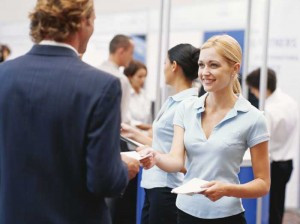Getting an Edge Over the Competition
Pet Age Staff //January 6, 2014//
Attending a trade show is not a small commitment, whether you’re manning a booth as an exhibitor or just walking the floor as an attendee.
In addition to the travel costs and the days spent away from your store, you’re subjecting yourself to physical and mental fatigue without any guarantee of tangible benefits for doing so.
So, if you’re going to commit yourself to all that, you need to know it’s really important, to your store and to your career, to be in attendance at the industry’s most important gatherings.
 To Andy Darmohraj, executive vice president and chief operating officer of the American Pet Products Association, it’s an easy case to make. Each year, APPA hosts the Global Pet Expo, an event that draws pet retailers, product suppliers and other key industry figures from across the country. The event is always a big draw, Darmohraj says, because it equips those who attend with the knowledge they need to keep excelling in the industry.
To Andy Darmohraj, executive vice president and chief operating officer of the American Pet Products Association, it’s an easy case to make. Each year, APPA hosts the Global Pet Expo, an event that draws pet retailers, product suppliers and other key industry figures from across the country. The event is always a big draw, Darmohraj says, because it equips those who attend with the knowledge they need to keep excelling in the industry.
Getting Ahead
Trade show attendance can make the difference between being the first to offer an emerging hot product, or being hopelessly behind the curve. It can also mean your competitors are implementing new ideas and best practices to improve their store operations while you’re still stuck doing the same things that have produced mediocre results for you for decades.
The amount of knowledge available at a major industry trade show could take years to accrue in any other way. But retailers who decide to attend have to be smart about how they use their time if they want to take full advantage of what a show has to offer.
“It falls on the retailer,” Darmohraj said. “You need to know what you’re looking to add, how many SKUs you want to add, what kind of money you’re looking to spend. And it’s easy to get overwhelmed with the amount of product that’s out there, so you have to come to a trade show with an idea of what you’re looking to accomplish.”
Successfully taking away the knowledge you need from a trade show means having a strategy before you get there, and knowing how you’ll use what you’ve obtained after.
“You’ll talk to people, you’ll see lots of stuff,” Darmohraj said. “And once you’re back at your store, you’ll have to figure out what you really want to order, how much of it you want.”
Part of planning ahead means making advance arrangements for when you want to talk to people. If you don’t see the value of that, try randomly wandering up to an exhibitor’s booth hoping to have a meaningful conversation, only to find that a crowd of seven other people had the same idea. Now you’re facing a choice between standing there waiting, and thus missing out on other things the show has to offer, or wandering away and taking the chance you’ll get the opportunity to speak with that person later.
“To come in and say, ‘I’m just going to walk the show and see what I can find’ is a really bad way to walk the show,” Darmohraj said. “A couple months ahead of time you have to decide whether there are any vendors you’re currently working with or want to work with that you need to talk to, and you need to set up appointments with those folks.”
Buyers especially can find trade shows tiring and exasperating, which is why they sometimes sell themselves, and the experience, short if they make the decision to only take in part of the show.
Some trade show advice, like wearing comfortable shoes, is so well-known as to be almost intuitive for attendees.But other tips are not quite so obvious.
The California Small Business Development Center, along with some additional comments from the PetAge staff offered some tips:
Get in shape. It’s walking, not running, but it’s an awful lot of it. In addition to the predictable call for comfortable shoes, you need conditioned muscles that are ready for the long haul.
Otherwise you’ll be catching your breath while your competitors are snatching up what you came to get.
Attend events, not just booths. A lot of what you can learn takes place at seminars, panel discussions and other presentations apart from the exhibition floor. You need to find out in advance when and where to attend the events that will benefit you most.
Stay up late. You can head back to your hotel room right after the show closes for the day if that’s what you really want to do, but an awful lot of business takes place among people who get together for dinner or other forms of socializing.
Follow up. All those business cards you’ve collected? What are you going to do with them? They represent relationships you can build, or they could just represent a pile of hard-stock paper on your desk. Why did you go to the show again?
– Dan Calabrese



















